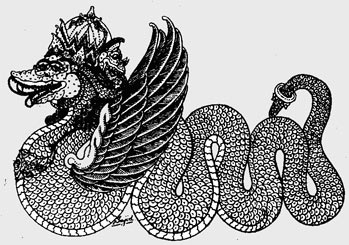Anantaboga on:
[Wikipedia]
[Google]
[Amazon]
 Antaboga is the world
Antaboga is the world
 Antaboga is the world
Antaboga is the world serpent
Serpent or The Serpent may refer to:
* Snake, a carnivorous reptile of the suborder Serpentes
Mythology and religion
* Sea serpent, a monstrous ocean creature
* Serpent (symbolism), the snake in religious rites and mythological contexts
* Serp ...
of traditional pre-Islamic Javanese mythology (before the era of Demak kingdom
The Demak Sultanate (کسلطانن دمق) was a Javanese Muslim state located on Java's north coast in Indonesia, at the site of the present-day city of Demak. A port fief to the Hindu-Buddhist Majapahit kingdom thought to have been founded ...
). It is a derivative from Shiva-Hinduism Ananta Shesha
Shesha (Sanskrit: शेष; ) , also known as Sheshanaga (Sanskrit: शेषनाग; ) or Adishesha (), is a serpentine demigod (Naga) and Nagaraja (King of all serpents), as well as a primordial being of creation in Hinduism. In the Pura ...
combined with Javanism Javanism is the Javanese folk religion originally practiced in the central and eastern hemisphere of Java.
Javanism may refers to:
* Kapitayan
Kapitayan (from jv, ꦏꦥꦶꦠꦪꦤ꧀) is a belief of ancient people on Java island, namely th ...
. After the fall of the kingdom of Majapahit and the ascent of Islam in Java, the centre for Hinduism shifted to Bali.
These days many of the old myths and legends are celebrated in the wayang
, also known as ( jv, ꦮꦪꦁ, translit=wayang), is a traditional form of puppet theatre play originating from the Indonesian island of Java. refers to the entire dramatic show. Sometimes the leather puppet itself is referred to as . Perfor ...
performance that became a vehicle to combine the syncretic philosophies from outside with those philosophies and ideas already rooted within the local cultures and traditions.
At the beginning of time, only Antaboga existed. Antaboga meditate
Meditation is a practice in which an individual uses a technique – such as mindfulness, or focusing the mind on a particular object, thought, or activity – to train attention and awareness, and achieve a mentally clear and emotionally calm ...
d and created the world turtle Bedawang from which all other creations sprang. According to Sundanese myth, Antaboga was also responsible for the birth of Dewi Sri
Dewi Sri or Shridevi (Javanese language, Javanese: ꦢꦺꦮꦶꦱꦿꦶ, Balinese language, Balinese: ᬤᬾᬯᬶᬲ᭄ᬭᬶ, Dewi Sri)(Sundanese language, Sundanese: ᮑᮄ ᮕᮧᮠᮎᮤ ᮞᮀᮠᮡᮀ ᮃᮞᮢᮤ, Nyai Pohaci Sanghyang ...
, the rice goddess of Java and Bali. According to "Wawacan Sulanjana
Wawacan Sulanjana is a Sundanese manuscript containing Sundanese myths. The title means "The Tale of Sulanjana", derived from the name of the hero Sulanjana as the protector of rice plant against the attack of Sapi Gumarang cow, Kalabuat and Bud ...
", Dewi Sri emerges from the tears that turned into an egg, shed by Antaboga.
Etymology
The name Antaboga derived from theSanskrit
Sanskrit (; attributively , ; nominally , , ) is a classical language belonging to the Indo-Aryan branch of the Indo-European languages. It arose in South Asia after its predecessor languages had diffused there from the northwest in the late ...
term '' ananta'' (endless) and ''boga'' (food, possession or wealth). As resulting, Antaboga could be translated as "endless food" or "endless wealth".
Notes
Javanese mythology Legendary serpents Nāgas World-bearing animals {{Asia-myth-stub